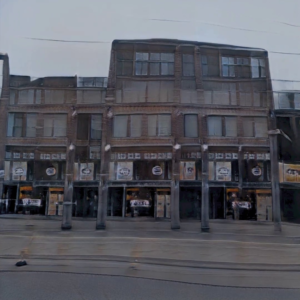As his submission to the 2022 Antimatter film festival, Toronto-based video artist Warren Chan created City of Forever, a series of shifting, morphing AI-generated images of urban landscapes devoid of humanity, accompanied by an eerie, frenetic soundtrack. Chan originally began the video project as his grad school thesis, a way to examine the feeling of alienating unfamiliarity of moving to a new city, feeling lost and out of touch with community, but when COVID decimated social life as we know it, he gained a different perspective.

“That original idea I had felt like something that was no longer really relevant to me. It’s strange to examine the alien isolation of a new city when everybody was feeling alienated,” says Chan. “Eventually I stumbled on this short story [by Jorge Luis Borges], ‘The Immortals,’ and it felt like I had found that missing key piece that made everything lock into place. I took the images I had already created and tried to contextualize it within the themes of Borges’ writing, the reciprocal relationship between reality and fiction, infinite permutations of things and others.”
The topic of AI-created art is a vast and existentially frightening concept, where lifeless computer algorithms can, in mere seconds, create stylized, artistically relevant images that rival those which humans historically would have had to pour hours of work, emotion, and passion into to create an equivalent product. As an artist, Chan doesn’t feel intimidated by AI artwork—he simply feels that it’s a tool a human artist can use to further express their ideas.
“With AI art, I think there is always that conversation of ‘Will this replace artists?’ and to me, I think the technology will always be used as a tool towards creative expression,” says Chan. “I also think what’s a more interesting question for the technology is not about whether it will replace human artists, because I don’t believe it will, but more how it impacts audiences’ relationships to more traditional forms of art and media.”
The notion that AI can create art challenges the basic understanding that, for all of known history, creating bespoke artwork has always been a solely human endeavour. AI technology makes us question what artwork truly is. Is it an expression of human emotion and creativity, or is there merely an algorithmically predictable recipe that will generate images that trigger some intrinsic human propensity to gather inspiration from patterns and forms in the world around us? For Chan, the question is not black and white, because AI is always created by humans, through a human lens, so the output, while it seems emotionless and mechanical, is simply a human expression by proxy.
“With AI art, someone created the code for AI, someone created the images that were fed into the AI, somebody curated the output—there’s so much human input into this final image that might seemingly feel so distant from humanity, but leading up to it, there’s so many people’s work that went into that,” he says. “When I was writing my proposal, one quote that I highlighted was from J.G. Ballard’s autobiography, where he reflected on when he was working for a literary magazine. He created this AI-generated poetry, and his colleagues said ‘This is as good as the real thing,’ and J.G. Ballard said, ‘No, this is the real thing.’ There’s that aspect of AI art that makes us question what art is, and what we should expect it to be.”
Antimatter
Various times,
Thursday, October 20 to Sunday, October 30
Free/by donation, various venues
antimatter.ca
